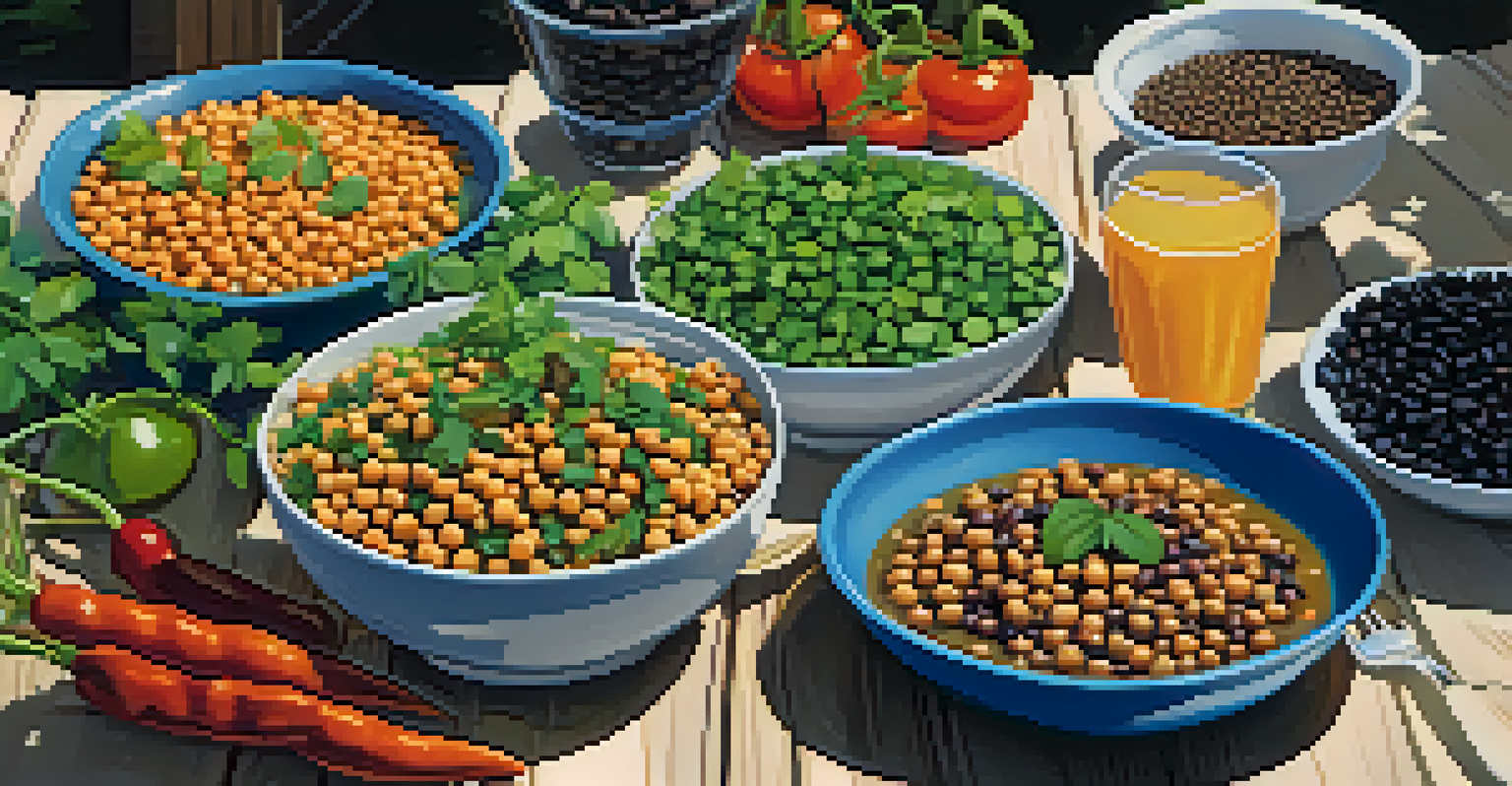Understanding Protein Sources: Essential for New Vegetarians

What is Protein and Why is it Important?
Protein is a vital macronutrient that plays a crucial role in building and repairing tissues in our bodies. It’s made up of amino acids, which are often referred to as the building blocks of life. For vegetarians, understanding the importance of protein is essential, as it helps maintain muscle mass, supports immune function, and contributes to overall health.
Let food be thy medicine and medicine be thy food.
When transitioning to a vegetarian diet, many people worry about getting enough protein. However, with a little knowledge, it's possible to meet your protein needs without consuming meat. This shift can also lead to discovering new and exciting food options that are rich in protein.
Incorporating an adequate amount of protein into your diet helps ensure that you're not just filling up on carbs and fats. It's about finding the right balance that keeps your energy levels steady and supports your health goals, which can be particularly important for new vegetarians adjusting to a different way of eating.
Dairy and Eggs: Complete Protein Sources
For lacto-ovo vegetarians, dairy products and eggs are excellent sources of complete protein, meaning they contain all essential amino acids. Foods like Greek yogurt, cottage cheese, and eggs not only provide high-quality protein but also offer other essential nutrients like calcium and vitamin B12, which are crucial for those avoiding meat.

Including dairy and eggs in your diet can enhance your protein intake without much effort. For instance, a quick breakfast of scrambled eggs or a smoothie made with yogurt can easily boost your protein levels. Plus, these foods are versatile and can be incorporated into a wide variety of meals.
Protein is Essential for Health
Protein plays a crucial role in building and repairing tissues, maintaining muscle mass, and supporting overall health.
However, if you're lactose intolerant or choose not to consume dairy, there are plenty of plant-based alternatives that can help fill the gap. Options like fortified almond milk or vegan yogurt can offer some protein while also being delicious and satisfying.
Legumes: Powerhouses of Plant Protein
Legumes, such as beans, lentils, and chickpeas, are fantastic sources of plant-based protein. Not only are they rich in protein, but they also provide fiber, which aids digestion and keeps you feeling full longer. This makes legumes an excellent choice for new vegetarians looking to create hearty meals.
The food you eat can be either the safest and most powerful form of medicine or the slowest form of poison.
Incorporating legumes into your diet can be as simple as adding them to soups, salads, or stir-fries. For instance, a chickpea salad with fresh vegetables and a tangy dressing can be both nutritious and satisfying. Plus, legumes are often budget-friendly, making them accessible for everyone.
Additionally, legumes offer a variety of flavors and textures, allowing for creative cooking. Whether you prefer the creamy texture of lentils or the heartiness of black beans, there’s a legume out there to suit your taste and dietary needs.
Nuts and Seeds: Small but Mighty Protein Sources
Nuts and seeds may be small, but they pack a powerful protein punch! Almonds, walnuts, chia seeds, and hemp seeds are just a few examples of these nutrient-dense foods. They also provide healthy fats, vitamins, and minerals, making them a great addition to any vegetarian diet.
Snack time is an ideal opportunity to incorporate nuts and seeds. A handful of almonds or a sprinkle of chia seeds on your morning yogurt can significantly boost your protein intake. Plus, they’re easy to carry on-the-go, making them a convenient option for busy lifestyles.
Diverse Protein Sources for Vegetarians
Vegetarians can meet their protein needs through various sources like dairy, legumes, nuts, seeds, whole grains, and soy products.
However, it's important to enjoy nuts and seeds in moderation, as they can be high in calories. Finding the right balance is key, as these foods can contribute to a well-rounded diet while supporting your health goals as a new vegetarian.
Whole Grains: More Than Just Carbs
Whole grains like quinoa, brown rice, and farro are often overlooked when it comes to protein, but they can be an excellent addition to a vegetarian diet. Quinoa, in particular, is a complete protein, meaning it contains all nine essential amino acids, making it a standout choice for those avoiding meat.
Incorporating whole grains into your meals not only adds protein but also provides valuable fiber and nutrients that support overall health. For example, a quinoa salad with vegetables and a light dressing can be a delightful and filling dish that keeps you energized throughout the day.
Additionally, using whole grains as a base for meals can help create a more balanced plate. By combining grains with legumes or vegetables, you can easily enhance your protein intake while also enjoying a diverse range of flavors and textures.
Soy Products: Versatile Protein Options
Soy products like tofu, tempeh, and edamame are fantastic sources of protein for vegetarians. Tofu, for example, is incredibly versatile, absorbing flavors from marinades and spices, making it a great addition to a variety of dishes—from stir-fries to smoothies.
Tempeh, on the other hand, is fermented soybeans that provide a nutty flavor and a firmer texture, making it a great meat substitute in recipes. A tempeh sandwich or a tofu curry can be both delicious and packed with protein, satisfying your cravings while keeping your diet balanced.
Combine Proteins for Complete Nutrition
Mixing different protein sources can ensure vegetarians receive all essential amino acids for a balanced diet.
Including soy products in your meals not only enhances your protein intake but also offers additional health benefits. They are a good source of antioxidants and can help promote heart health, making them a smart choice for anyone looking to improve their diet.
Combining Protein Sources for Complete Nutrition
For vegetarians, combining different protein sources is key to ensuring you get all essential amino acids. While some plant-based proteins are incomplete, pairing them can create a complete protein profile. For instance, rice and beans together provide a full range of amino acids, making for a nutritious meal.
Think of it like a puzzle: each protein source has its unique pieces that fit together to complete the picture of a balanced diet. By mixing and matching different foods, you can enjoy a wide variety of flavors while also meeting your nutritional needs.

Experimenting with different combinations can also keep your meals exciting and diverse. From grain bowls to veggie wraps, the possibilities are endless, allowing you to discover new favorites while ensuring you're getting the protein your body needs.